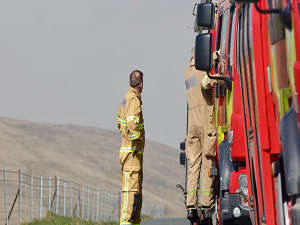
By Cate McCurry, PA
The impact of a hard Brexit on an economy already struggling with Covid-19 could be much worse than previously predicted, research has found.
As the Covid-19 pandemic continues to have a major impact on the Irish economy, the risk of a Brexit without a free trade agreement by the end of the year continues to grow.
Research released by the Economic and Social Research Institute (ESRI) and the Department of Finance found that while the potential economic impacts of Brexit have been substantially overshadowed by the Covid-19 crisis, adding a hard Brexit on a fragile economy could make the previously estimated effects of Brexit worse.
The ESRI also found there is limited overlap between the sectors at risk from a hard Brexit and those being most impacted by Covid-19.
Each sector is ranked in terms of its exposure to each shock using three categories: severely affected, moderately affected and unaffected sectors.
Those worst affected by Covid-19 were wholesale and retail trade, accommodation and food services, construction and industry.
Using estimates based on modelling trade barriers in goods and services, ESRI found that these sectors are limited in terms of exposure to Brexit.
The industries Brexit trade barriers would be expected to most strongly impact include agriculture, food and traditional manufacturing as these are all highly reliant on the UK as an export destination.
Financial services are also potentially highly exposed to changes in market access between the UK and EU, the report said.
No sector was in a category of severely exposed to both Brexit and Covid-19.
However, some sectors did fall into the category of being severely exposed to one shock and moderately exposed to the other, a combination that leaves them at some risk if the two shocks are combined.
The research also notes that the ranking of risk exposure is at a sector level and impacts on individual firms may differ from this.
It also found limited exposure of sectors most impacted by Covid-19 being further hit by Brexit.
Martina Lawless, author of the report and a research professor at the ESRI, said: “Overall, these findings suggest that adding the Brexit shock to that of Covid-19 brings a wider range of sectors exposed to economic risk but that they do not layer further substantial risks on to those sectors that have already taken the largest Covid-19 hit.”


 Man arrested after Newry stabbing incident
Man arrested after Newry stabbing incident
 Firefighters tackle almost 150 wildfires across three days in Northern Ireland
Firefighters tackle almost 150 wildfires across three days in Northern Ireland
 Business Beats Cancer Belfast Raises an Incredible £50,000 for Cancer Research UK
Business Beats Cancer Belfast Raises an Incredible £50,000 for Cancer Research UK
 Teenager killed in early morning road crash
Teenager killed in early morning road crash